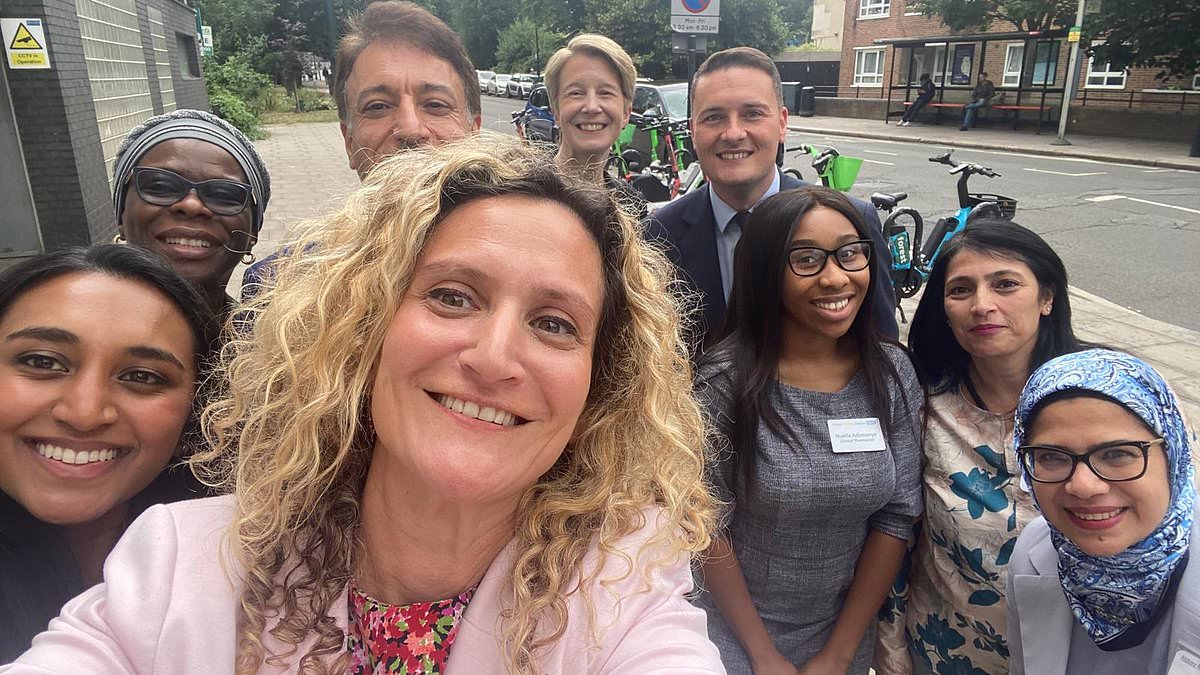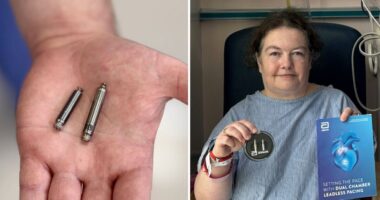Our new Health Secretary, Wes Streeting, paid a visit to my practice in London last week – on his first day in the job.
He chose to come to us first on the advice of NHS chief executive Amanda Pritchard, who I had previously invited to come see the good work we were doing.
Mr Streeting sent a clear message that he plans, as he put it, to ‘fix the front door to the NHS’.
Billions of pounds would be diverted from hospitals to GP surgeries, he said, to resolve the crisis which has seen patients struggle to get appointments.
Despite record demand, we get just ten per cent of the £165 billion NHS budget, so this was welcome news.
I liked Mr Streeting. But it’ll take more than cash and supportive words to fix the monumental issues facing patients in primary care.
Having had a few days to reflect on our meeting, I’ve come up with my own five-point plan – should he choose to listen – could go some way to resolving the crisis.
So good luck, Wes…

Wes Streeting with Dr Ellie and her colleagues outside their surgery in London

Health Secretary Wes Streeting (left) with Chief Executive of NHS England, Amanda Pritchard on July 8
End the mad rush for appointments at 8am
It has been the biggest gripe from Mail on Sunday readers over the past few years – the requirement to ring GP surgeries at 8am to bag an appointment.
Many can’t get through, or are left on hold for ages only to find there are no appointments left and will have to try again the next day. This delays crucial treatment for those who need it – and some people just give up trying altogether.
This flawed system must stop. And some practices, like mine, have managed to get rid of those frustrating queues.
When our patients want to be seen, they ring up and our receptionist will place their details on a list. One of us GPs will go through the list and decide who needs to be seen that day and who can wait a while – for example, a patient with chest pain, which could be a sign of a heart problem, versus someone with a chronic rash.
Our support team will send texts to the patients to let them know when they will be seen. Crucially, it means severely unwell patients get to the front of the queue.
Some people get upset that they can’t be seen immediately, but it is an efficient system and protects the most patients from harm.
The problem is that despite clear evidence that systems like ours work well, not every practice works this way, so we end up with a two-tier NHS where some patients benefit and others really struggle.
That isn’t fair. We must streamline it so all patients have equitable access to their GP, not just those lucky enough to live close to a good practice.
How a 50p charge can tackle the no-shows
This was my controversial recommendation five years ago, and I stand by it.
I say it with a heavy heart, because I believe the health service should be free at the point of delivery. But that small 50p charge is a token gesture to change people’s mindset about wasting GPs’ time.
The latest figures, from May 2023, reveal there were 1.2 million DNAs – did not attends – in general practice.

The latest figures, from May 2023, reveal there were 1.2 million DNAs – did not attends – in general practice (stock photo)
Over a year, that’s 14.4 million appointments. Every ten-minute GP appointment costs the NHS around £30, which means £432 million is being wasted.
Charging 50p is enough to make people think twice about wasting doctors’ time but not to leave them out of pocket. Think of the charge on plastic bags, which has seen use drop by over 90 per cent. Potentially we’d save millions and reduce waiting times. And it’s cheaper than the £10 charge Rishi Sunak suggested last year.
Swiftly end the drug shortage nightmare
Every day, patients tell us they can’t get the medication we prescribe them.
That’s why this newspaper has launched a campaign to End The Drugs Shortages with four key demands: giving pharmacists the power to make substitutions when drugs are out of stock; forcing manufacturers to give advance warning of shortages; create a public database for patients to check where drugs are in stock; and allowing patients to use better-stocked hospital pharmacies to source medication.
Mr Streeting knew about the problems but didn’t give anything away. He must prioritise this before it takes up more GP time and puts more patients at risk.
Use NHS app to replace time-consuming admin
It might not sound like a priority, but there is a lot of admin dumping on GPs which is preventing us seeing more patients.
We’re asked to write patients letters to give to housing authorities about their health needs while letters explaining absences from school and even letters to cancel gym memberships.
It’s hugely frustrating and it is not a GP’s job.
If the NHS app worked better, patients could use it to download their diagnoses and the drug treatments they’re on, which could be passed on where appropriate.
And if the app was better, patients could even book themselves in to see hospital specialists.

Every day, patients tell tell GPs they can’t get the medication they are prescribed (stock photo)
Make first aid part of the national curriculum
Young people have far less capacity to look after themselves. Research suggests that many under-25s will see a GP for a minor medical issue, such as a cut.
Dealing with these visits takes up GP time when they could easily be dealt with by a pharmacist – or even by the patient themselves.
This is why I think schools should teach first aid. And I’m not just talking about CPR. Children should know basic medical tasks such as how to dress a wound or what to do when they twist their ankle.
I appreciate schools are under pressure, but providing these skills could go a long way to freeing up appointments.
Pharmacy First, which allows chemists to treat seven conditions such as sinusitis, earaches and sore throats, is a start, but we need to empower more people to help themselves when they can.










